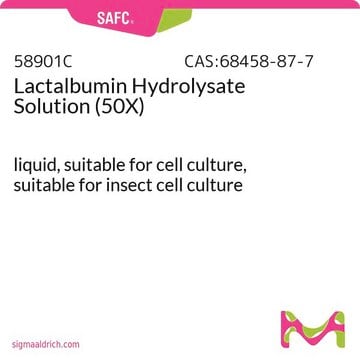S0146
Schneider′s Insect Medium
With ʟ-glutamine and sodium bicarbonate, liquid, sterile-filtered, suitable for insect cell culture
Synonym(s):
Schneider’s Drosophila Medium
About This Item
Recommended Products
product name
Schneider′s Insect Medium, With L-glutamine and sodium bicarbonate, liquid, sterile-filtered, suitable for insect cell culture
sterility
sterile-filtered
form
liquid
technique(s)
cell culture | insect: suitable
suitability
suitable for culture of other dipteran cell lines (Originally developed for the culture of Drosophila cells)
components
NaHCO3: 0.4 g/L
glucose: 2 g/L (Dextro)
L-glutamine: 1.8 g/L
shipped in
ambient
storage temp.
2-8°C
Looking for similar products? Visit Product Comparison Guide
Application
- to culture Drosophila neuronal cell line (BG3-c2 cells)
- to cultivate subcultures of Leishmania major for promastigote growth inhibition assay
- to seed purified ookinetes with Drosophila melanogaster S2 cells to assess the effect of the avermectin compound on cell development and to promote oocyte development
also commonly purchased with this product
Storage Class Code
12 - Non Combustible Liquids
WGK
WGK 1
Flash Point(F)
Not applicable
Flash Point(C)
Not applicable
Certificates of Analysis (COA)
Search for Certificates of Analysis (COA) by entering the products Lot/Batch Number. Lot and Batch Numbers can be found on a product’s label following the words ‘Lot’ or ‘Batch’.
Already Own This Product?
Find documentation for the products that you have recently purchased in the Document Library.
Customers Also Viewed
Our team of scientists has experience in all areas of research including Life Science, Material Science, Chemical Synthesis, Chromatography, Analytical and many others.
Contact Technical Service






